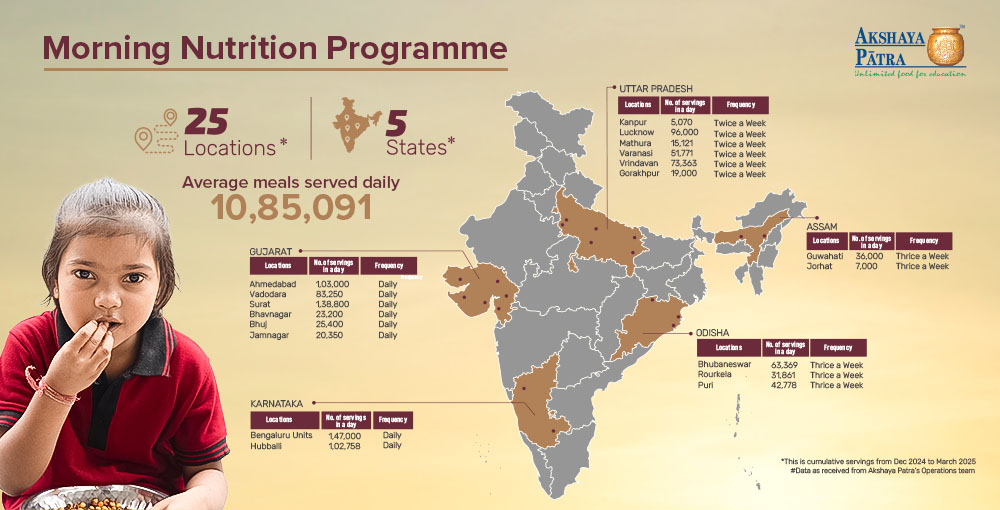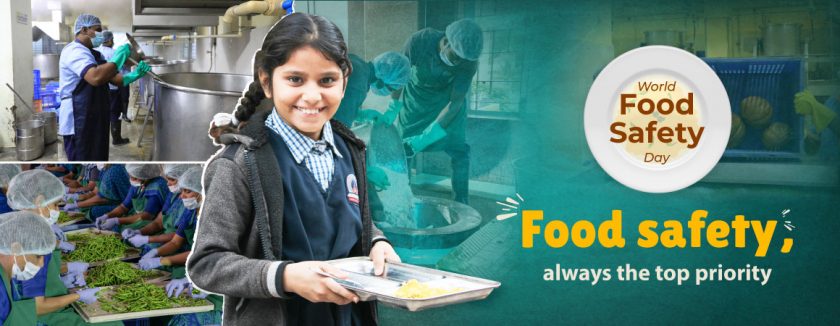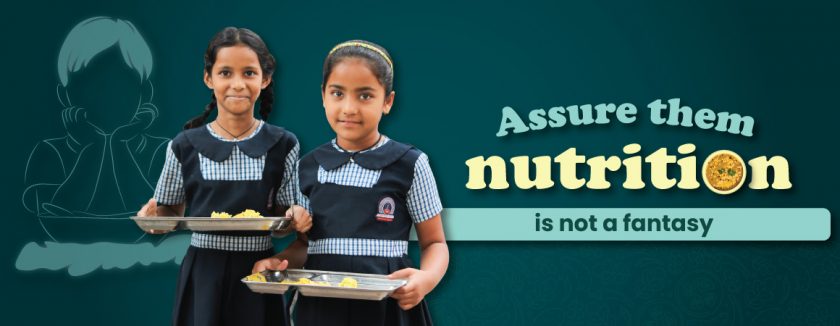Our journey began in the year 2000 with a vision to ensure that “No child in India shall be deprived of education because of hunger.” Starting with just 1,500 children in Bengaluru, we have grown into one of the world’s largest NGO-run school feeding programme, serving more than 2.33 million beneficiaries every day across 16 states and 3 union territories. Over the years, our work has expanded into multiple feeding initiatives, each designed to address hunger in a holistic way.
PM POSHAN (Mid-Day Meal) Programme
Our flagship initiative, the Mid-Day Meal Programme, is implemented in partnership with the Government of India and various state governments. Every school day, we provide freshly cooked, nutritious meals to more than 23,000 government and government-aided schools. This initiative not only ensures that children are nourished but also helps reduce dropout rates and improves learning outcomes for children.
Support the school meal programme and help children learn on a full stomach.
Morning Nutrition Programme
To ensure that children start their school day on the right note, we serve ready-to-eat snacks as part of our Morning Nutrition Programme. Active in six states, this programme provides fortified energy snacks, milk, and other wholesome options. By complementing the mid-day meals, morning nutrition helps children stay attentive and active throughout the day.
Contribute to the Morning Nutrition Programme and give children the energy to begin their day right.
Anganwadi Feeding
We believe that good nutrition must begin at the earliest stages of life. Through our Anganwadi Feeding Programme, we provide hot, nutritious meals to toddlers, as well as expectant and lactating mothers. This supports healthy physical and cognitive development during the crucial early years and aids in the Government’s efforts to tackle child malnutrition.
Donate to the Anganwadi Feeding Programme and nurture healthier childhoods.
Feeding Homeless Mothers
Many homeless and destitute mothers face the harsh reality of hunger daily. Through this initiative, we provide aged women living in ashrams, with wholesome meals that restore health and dignity. Supporting this programme not only nourishes women but also gives them a peaceful retired life.
Extend your support to senior mothers and help them live with dignity.
Impact and Sustainability
For more than two decades, Akshaya Patra has served more than 4 billion meals. Our state-of-the-art kitchens, some equipped with biogas plants and solar technology, demonstrate our commitment to scale, quality and sustainability. Each meal we serve is more than just nourishment; it is a promise of hope, dignity and a brighter future.
Voices that give you a clear picture

Manoj Nayak (Father of Parvati Nayak, 4th grade, 124 No. Hatigarh Metelimedhi LPS, Jorhat)
27-year-old Manoj Nayak is the father of two children. The older one, Parvati Nayak, is a 4th grade student of 124 No. Hatigarh Metelimedhi LPS, Jorhat, Assam. She attends school with her 6-year-old brother, studying in 1st grade.
“My children are happy with the lunch served in school. They don’t feel like eating anything when they come home, even if their favourite dish is made. The meals cover the breakfast they skip at home. Every day, they come home and tell us how tasty the food is. They are delighted with it.”

C H Kavitha, Warangal
I come to the Anganwadi centre every day. Eating here helps keep me and my baby healthy, walking to the centre keeps me active and I learn a lot by talking to the women and teachers here. I’ve been coming here for 3 months since the pregnancy was confirmed. At home, I’m not able to eat as much as my body needs. Eating here feels safe for women like us. And I can also eat more while talking to women like me. When I deliver, I’ll surely send them here to eat.

Shobha Daasi
On behalf of every mother living here, I heartily thank Akshaya Patra and all the donors for taking care of our food. I love the food we are served. The menu changes every day and amongst all the dishes my favourites are paneer curry and kheer. I wholeheartedly bless everyone involved with the NGO and wish them further growth.
At Akshaya Patra, every initiative we undertake stems from a singular belief: no one should go hungry. From children in schools to aged mothers in the ashrams, from toddlers in Anganwadis to families struck by disasters, our feeding programmes are designed to serve with compassion and scale. With your support, we can ensure that hunger never stands in the way of potential, dignity or hope.
Join us in our mission. Your contribution today can transform lives tomorrow.




































